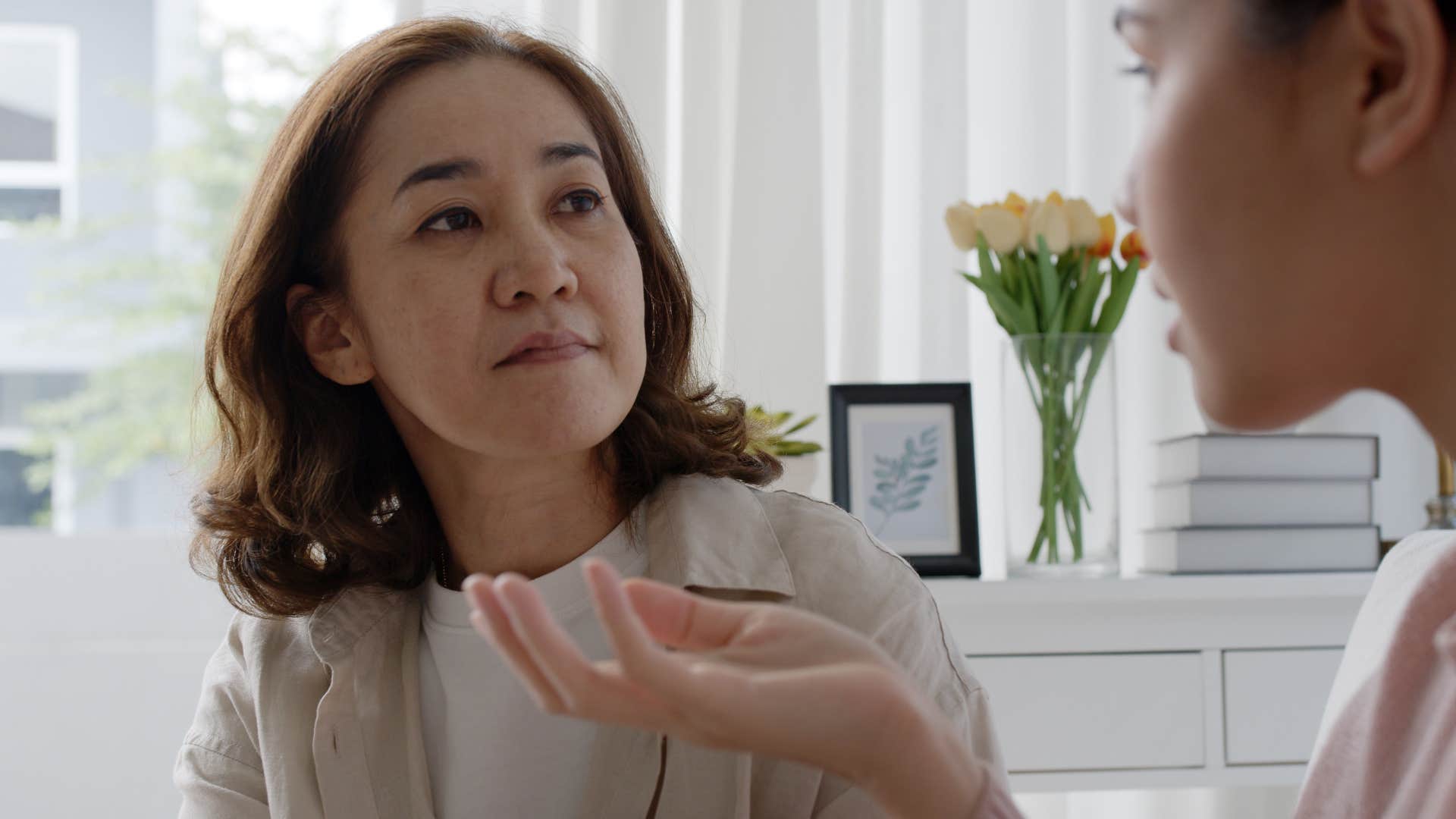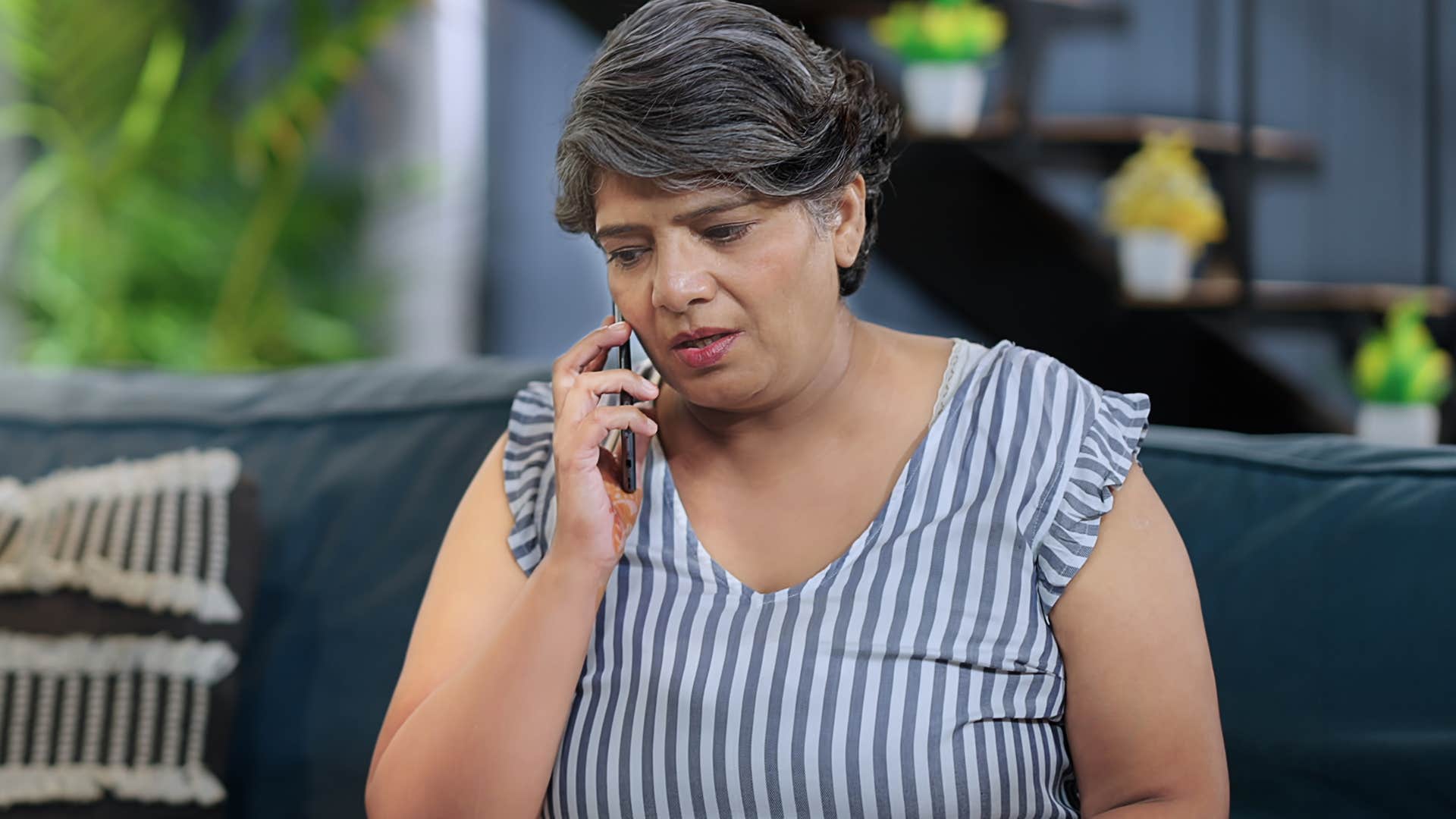11 Backhanded Compliments Parents Use That Unintentionally Drive Their Adult Kids Away
Condescending language is subtle and unsuspecting, but just as demoralizing.
 BearFotos | Shutterstock
BearFotos | Shutterstock Rooted in comparison culture, status, external validation and praise, backhanded compliments are inherently interwoven into many aspects of our conversations and language, sometimes unsuspectingly and without malicious intent. However, no matter how they're phrased or utilized in conversations, they can lower productivity and spark divisiveness, according to experts from Harvard Business School, in ways that have negative consequences on the workplace, relationships, and personal well-being.
In a family dynamic, the backhanded compliments parents use that unintentionally drive their adult kids away can spark a similarly upsetting disconnection. From sparking resentment in adult children, to promoting vague boundaries, and keeping poor communication flourishing, backhanded compliments often drive parents even further away from their kids, sabotaging each side's well-being as well as their entire relationship.
Here are 11 backhanded compliments parents use that unintentionally drive their adult kids away
1. 'You actually have great taste'
 fizkes | Shutterstock
fizkes | Shutterstock
Any kind of "compliment" that uses the word "actually" is typically backhanded, conveying some kind of surprise over their adult child's success, independence, or even their style. These annoying, condescending phrases can seem innocent and unsuspecting, but they're usually some kind of subtle criticism that drives resentment and subtly disconnects people in their relationships.
Psychologist Seth J. Gillihan argues that this overly critical language isn't just a detriment to a parent-child relationship, but also an adult child's trust, self-esteem, and general well-being. They feel like no matter how hard they work, what they accomplish, or how they navigate adulthood, they'll never be enough to truly satisfy their parent's expectations.
2. 'You're surprisingly independent'
 wavebreakmedia | Shutterstock
wavebreakmedia | Shutterstock
Similar to "actually," using the word "surprisingly" in a seemingly innocent compliment can convey a kind of condescension, like you're shocked that a person could actually have a good trait or character shift.
A phrase like "you're surprisingly independent" is one of the backhanded compliments parents use that unintentionally drive their adult kids away, undermining the autonomy that many adult children embrace later in life, and making them feel like they were never truly respected by their parents or imagined to be a successful person when they left home.
Like a study from Cardiff University suggests, condescension and backhanded compliments are almost always subtle, meaning they can spark discomfort, fuel resentment, and make people feel disconnected from each other without either person truly understanding why they feel upset or isolated.
So, whether you're an adult child or a parent, be intentional about the language you use and the boundaries you need to set, as it could mean safeguarding your mental health and protecting a healthy relationship at home.
3. 'Your place is much nicer than I expected'
 Chay_Tee | Shutterstock
Chay_Tee | Shutterstock
While many Gen Z and millennial adult children are currently stuck in a cycle of financial instability where cutting costs and accepting help from their parents is the only way they're staying afloat, making jabs at their living condition or subtly offering backhanded compliments on the well-being of their housing is not only distasteful, it's rude.
Of course, they're not going to be able to afford a home, or even an apartment, at the same scale as their parents at the same age, but that doesn't mean it's a fault of their own.
Offering up a backhanded compliment like "wow, this is nicer than I thought it'd be" or "your place is much nicer than I expected" might seem innocent and actually kind, but it only highlights the insecurities and struggles this generation of adult kids is already battling incessantly.
4. 'It's nice to see you finally doing something with your life'
 Daisy Daisy | Shutterstock
Daisy Daisy | Shutterstock
Not only does a phrase like this undermine an adult child's success and accomplishments, it sparks resentment and insecurity between parents and their adult kids. It's possible to simply empower and celebrate adult kids for everything they achieved, without trying to compare them to other people, make jabs at their shortcomings early in life, or tear down their excitement in the present moment.
Of course, some parents are innately fueled by jealousy, envy, and insecurity of their own that leads to condescension, but others may use backhanded compliments outside of spite, simply not recognizing the harmful nature of their word choice until it erupts from resentment in their kids down the road.
5. 'I'm proud of how you turned out, despite everything'
 fizkes | Shutterstock
fizkes | Shutterstock
The context of every one of the backhanded compliments parents use that unintentionally drive their adult kids away is important. If you heard a phrase like this on a surface-level, it could be kindhearted and thoughtful. Their adult kids persevered through adversity or succeeded despite having a rough childhood.
However, if a parent is subtly criticizing their choices, relationships, or even character traits to celebrate their current achievements, it can be disillusioning and disappointing for adult kids.
No matter how much someone has changed, how much they've accomplished, or the kinds of challenges they've overcome, they don't want to hear from their parents — the people they're supposed to be most loved and supported by — that they were once a point of insecurity or failing.
6. 'You're actually really good at that — who knew?'
 Raushan_films | Shutterstock
Raushan_films | Shutterstock
Many parents who struggle to view their adult children in their new independent lives also struggle to accept that they've changed, adopted new interests, or pursued things they didn't appreciate when they were kids. They're still holding onto the version of their kids early in life, which often prompts backhanded compliments like this one that undermine their ability to change.
The quickest way to undermine trust and spark divisiveness in a parent-child relationship is to hold them to unrealistic standards, like expecting that they won't change or constantly comparing themselves to an older version of themselves.
7. 'Can you afford that?'
 Chokniti Studio | Shutterstock
Chokniti Studio | Shutterstock
Like research from the Association for American Universities explains, backhanded compliments are generally rooted in comparison culture. They compare the person they're targeted at with other people, societal standards, and oftentimes a past version of themselves.
Especially when parents are using phrases like "Can you afford that?" with their adult kids, they're comparing them to a past version of themselves, one that might have struggled financially, asked them for help with money, or was simply a child without a job or income.
Equally annoying and demoralizing, these phrases undermine adult children's independence, including their ability to make their own financial decisions and make choices that serve their best interests.
8. 'You're much smarter than you used to be'
 Prostock-studio | Shutterstock
Prostock-studio | Shutterstock
According to a study published in Psychology and Aging, a great deal of the generational resentment and disconnect that occurs in parent-child relationships later in life is exacerbated by poor communication skills.
Whether it's misguided backhanded compliments parents use that unintentionally drive their adult kids away, refusing to listen, or being unsupportive of different opinions, this gap in communication can lead to much more resentment and divisiveness than connection.
Phrases like "you're much smarter than you used to be" are textbook backhanded compliments, because they're subtle, yet dismissive and rude. They compare adult children with a version of themselves that didn't know any better — a version of themselves that yearned for unconditional love and support from their parents, but was clearly only met with criticism and judgment.
9. 'I'm impressed, you finally stuck with something'
 ViDI Studio | Shutterstock
ViDI Studio | Shutterstock
The same phrase that we're told in kindergarten is applicable to mending tension in the parent-child relationship later in life, according to a study from the Journal of Family Psychology: "If you can't say something nice, don't say anything at all."
Even if you're unsure if a phrase is offensive or dismissive, don't use it. Especially in adulthood, adult kids are usually only looking for emotional support from their parents, not comments, unsolicited advice, and judgment that pushes them further away.
10. 'You're finally acting like an adult'
 fizkes | Shutterstock
fizkes | Shutterstock
When kids are kids, let them be innocent. Let them make mistakes, ask for guidance, and be unsure about what they want to do for the rest of their lives. It's their time to experiment, change their minds, and try new things, not feel judged and criticized for not being "mature" or parentified early in life.
By suggesting that a young adult child has "finally grown up" or "surprisingly become an adult," parents only strip their kids of the innocence that characterized their childhood. They're unable to look back on their memories and consider their experiences fondly without feeling like they were silently judged for simply being a kid.
Your words and language have power, even if you don't realize it, so be intentional with how you speak to others.
11. 'At least you're not like them'
 fizkes | Shutterstock
fizkes | Shutterstock
By weaponizing comparison culture between their adult kids and other people, parents who use backhanded compliments like this only lower their kids' self-esteem and urge them to seek external validation from others.
The same societal standards, whether they're online or in-person, that pressure young adults to compare themselves are prevalent in the backhanded compliments that condescending parents use. They're not just deteriorating the wellness of their relationships at home, but the self-esteem and trust that serves as a foundation for all their other interactions and connections.
Zayda Slabbekoorn is a staff writer with a bachelor's degree in social relations & policy and gender studies who focuses on psychology, relationships, self-help, and human interest stories.

